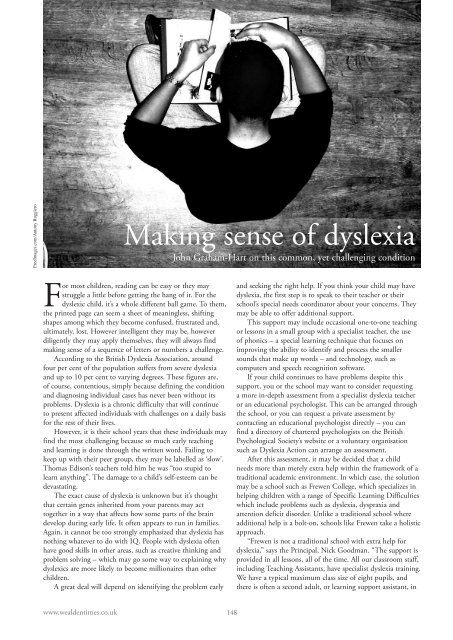Wealden Times | WT171 | May 2016 | Restoration & New Build supplement inside
Wealden Times - The lifestyle magazine for the Weald
Wealden Times - The lifestyle magazine for the Weald
You also want an ePaper? Increase the reach of your titles
YUMPU automatically turns print PDFs into web optimized ePapers that Google loves.
FreeImages.com/Antony Ruggiero<br />
Making sense of dyslexia<br />
John Graham-Hart on this common, yet challenging condition<br />
For most children, reading can be easy or they may<br />
struggle a little before getting the hang of it. For the<br />
dyslexic child, it’s a whole different ball game. To them,<br />
the printed page can seem a sheet of meaningless, shifting<br />
shapes among which they become confused, frustrated and,<br />
ultimately, lost. However intelligent they may be, however<br />
diligently they may apply themselves, they will always find<br />
making sense of a sequence of letters or numbers a challenge.<br />
According to the British Dyslexia Association, around<br />
four per cent of the population suffers from severe dyslexia<br />
and up to 10 per cent to varying degrees. These figures are,<br />
of course, contentious, simply because defining the condition<br />
and diagnosing individual cases has never been without its<br />
problems. Dyslexia is a chronic difficulty that will continue<br />
to present affected individuals with challenges on a daily basis<br />
for the rest of their lives.<br />
However, it is their school years that these individuals may<br />
find the most challenging because so much early teaching<br />
and learning is done through the written word. Failing to<br />
keep up with their peer group, they may be labelled as ‘slow’.<br />
Thomas Edison’s teachers told him he was “too stupid to<br />
learn anything”. The damage to a child’s self-esteem can be<br />
devastating.<br />
The exact cause of dyslexia is unknown but it’s thought<br />
that certain genes inherited from your parents may act<br />
together in a way that affects how some parts of the brain<br />
develop during early life. It often appears to run in families.<br />
Again, it cannot be too strongly emphasized that dyslexia has<br />
nothing whatever to do with IQ. People with dyslexia often<br />
have good skills in other areas, such as creative thinking and<br />
problem solving – which may go some way to explaining why<br />
dyslexics are more likely to become millionaires than other<br />
children.<br />
A great deal will depend on identifying the problem early<br />
and seeking the right help. If you think your child may have<br />
dyslexia, the first step is to speak to their teacher or their<br />
school’s special needs coordinator about your concerns. They<br />
may be able to offer additional support.<br />
This support may include occasional one-to-one teaching<br />
or lessons in a small group with a specialist teacher, the use<br />
of phonics – a special learning technique that focuses on<br />
improving the ability to identify and process the smaller<br />
sounds that make up words – and technology, such as<br />
computers and speech recognition software.<br />
If your child continues to have problems despite this<br />
support, you or the school may want to consider requesting<br />
a more in-depth assessment from a specialist dyslexia teacher<br />
or an educational psychologist. This can be arranged through<br />
the school, or you can request a private assessment by<br />
contacting an educational psychologist directly – you can<br />
find a directory of chartered psychologists on the British<br />
Psychological Society’s website or a voluntary organisation<br />
such as Dyslexia Action can arrange an assessment.<br />
After this assessment, it may be decided that a child<br />
needs more than merely extra help within the framework of a<br />
traditional academic environment. In which case, the solution<br />
may be a school such as Frewen College, which specializes in<br />
helping children with a range of Specific Learning Difficulties<br />
which include problems such as dyslexia, dyspraxia and<br />
attention deficit disorder. Unlike a traditional school where<br />
additional help is a bolt-on, schools like Frewen take a holistic<br />
approach.<br />
“Frewen is not a traditional school with extra help for<br />
dyslexia,” says the Principal, Nick Goodman. “The support is<br />
provided in all lessons, all of the time. All our classroom staff,<br />
including Teaching Assistants, have specialist dyslexia training.<br />
We have a typical maximum class size of eight pupils, and<br />
there is often a second adult, or learning support assistant, in<br />
www.wealdentimes.co.uk<br />
148


















